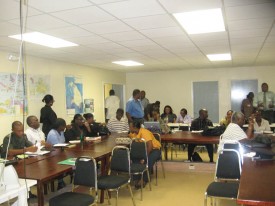 There is no telling when an earthquake will strike, as there isn’t a designated earthquake season. For this reason, the two disaster stakeholders have joined forces to sensitise the public on precautions that can be taken during this natural disaster.
There is no telling when an earthquake will strike, as there isn’t a designated earthquake season. For this reason, the two disaster stakeholders have joined forces to sensitise the public on precautions that can be taken during this natural disaster.Officials from NODS, the Ministry of Health and Social Transformation, the Ministry of Education and media personnel gathered at the NODS Office Complex during the workshop and campaign launch yesterday.
Giving remarks on behalf of the Minister of Health & Social Transformation, Permanent Secretary Beulah-Mae Charles said: “It is important that we are equipped and empowered so we know what to do.”
Director of NODS Philmore Mullin noted that Antigua & Barbuda is in a very active earthquake zone. He listed some of the tremors which have rocked the island dating back to 1819 and as recently as November 29, 2007.
Plus, who could forget the quake in 1974?
Since earthquakes do not come with the luxury of a 24-hour preparation warning, the director said it is important that persons learn how to protect themselves.
“Earthquakes are no strangers to Antigua & Barbuda,” he said. “We need to learn how to live with them.”
Mullin added that the construction of earthquake-resilient buildings on the island and having the necessary scientific mechanisms need to be taken into consideration when dealing with safety.
Meantime, CDEMA Programme Manager Andria Grosvenor said that the September transition of the Caribbean Disaster Emergency Response Agency (CDERA) to CDEMA fostered a more holistic approach to disasters, which “seeks to pro-actively address all hazards, at each phase of the disaster cycle by engaging all sectors of society – that is, public sector, private sector and of course the general public.”
Noting the correlation between earthquakes and tsunamis, the CDEMA representative said the group is implementing a Tsunami and Other Coastal Hazards (TCHWS), through funding from the United States Agency for International Development (USAID).
She said Friday, November 27, 2009 has been designated as Earthquake Awareness Day across the Caribbean region.
Consultant from Right Angle Imaging Inc Julius Gittens, meanwhile, through a Power Point presentation of Public Service Announcements (PSA), showed some life-saving tips which should be practised during an earthquake.
Some of the tips include taking cover under a strong table in a building, keeping away from windows and shelves and avoid using elevators and stairs.
If the tremor takes place while outdoors, look for an open space away from buildings and electricity poles and cover your head. Also, you shouldn’t move until the shaking stops and remember not to panic.
The consultant advocated that there should be more earthquake drills in schools and families should develop earthquake plans.
He urged the participants to spread the information they have learnt to others in society so that word could get around.
The objectives of yesterday’s workshop include reinforcing earthquake safety practices; enhancing the content of safety toolkits; building national capacity by developing a cadre of communicators trained in earthquake safety promotion; among others.
For further information, persons can visit www.beready.org
